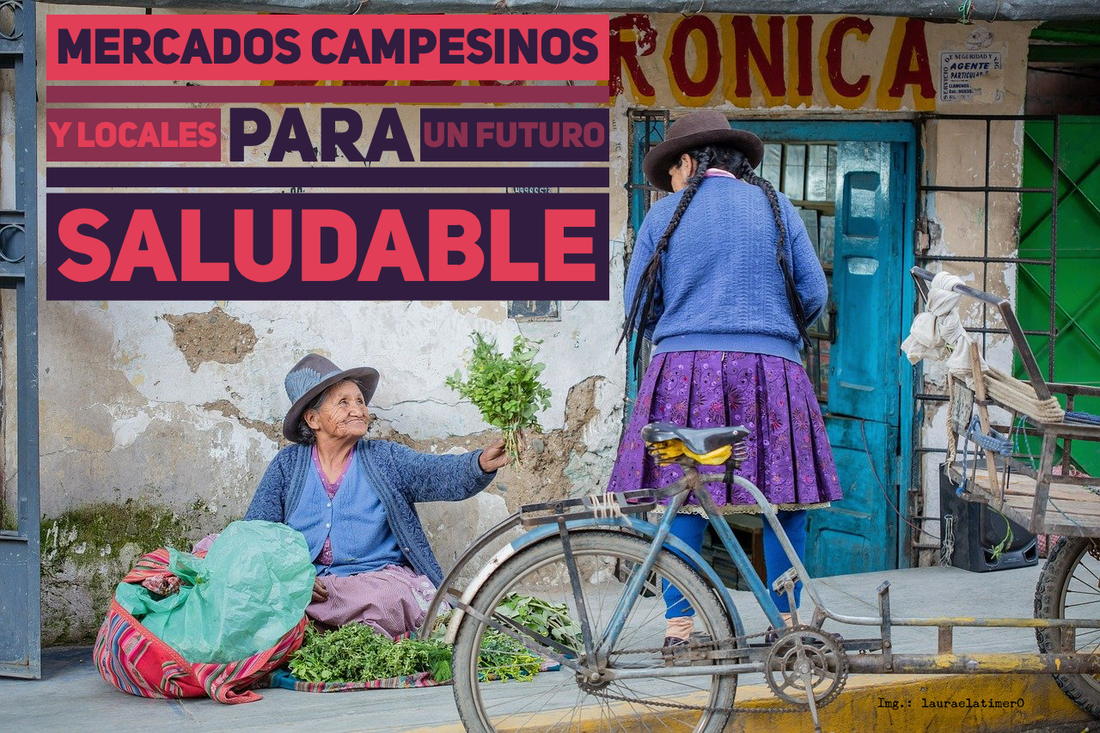
Farmers' and local market squares could heal us and save the national economy
Share
Farmers and local markets are crucial for the future

Market squares and farmers' markets are part of the idiosyncrasy and tradition of every town and city. Now, more than ever, they are regaining the relevance they once had and it is up to us to take notice of them and take advantage of this healthy alternative.
Farmers and local markets for a healthy future
There are several reasons why farmers' markets should prevail: not only for ecology, but for the economy and the health of each person, to summarize:
Supporting farmers markets means supporting low carbon footprint foods.

Most of the food purchased in grocery stores and supermarkets (fruit, vegetables, meat) often has to be shipped there, sometimes thousands of miles away by truck or plane. Buying local food shortens the distribution chain and less food is wasted in trucks and warehouses or thrown away if it was not purchased in the supermarket.
In contrast, food from a farmers' market comes from within a few hundred kilometres at most, is produced locally, and has been found to be entirely enriched with nutritional properties from what is produced naturally in the geographical area. According to Virtua Health magazine, fruits and vegetables begin to lose their nutrients within 24 hours of being picked, so the freshest produce is more nutritious. In addition, locally grown food is picked at its peak of ripeness, when it is most nutrient-dense.
In this sense, local, organic and regenerative crops would lead us to reduce the carbon footprint that each person leaves throughout their time on the earth.
" Locally grown " refers to food and other agricultural products (e.g., wool or flowers) that are grown or produced, processed, and then sold within a certain area. The term "local" is not officially defined or controlled, so depending on who you ask, it may be defined by distance to market, by staying within state or city borders, or by other regional boundaries.
Locally grown food has a strong connection to organic produce . For one, many local farms are organic (some certified, some not).
But more importantly, there is the intense debate about which is better: certified organic food or local food. While both local and organic food have pros and cons, people have very strong opinions about which is better, and many would like to buy both locally produced and organically grown food.
Regenerative agriculture, on the other hand, is a system of farming principles and practices that seeks to rehabilitate and improve the entire ecosystem of the farm, placing great importance on soil health and paying attention to water management, fertilizer use, etc. It is a farming method that "enhances the resources it uses, rather than destroying or depleting them."
By supporting farmers' markets, you support farmers in the areas surrounding your home and the local economy.

If you are aware of the support that farmers and peasants in the area need, the best thing you can do is buy their products directly from them.
Buying the same products from farmers in shops or supermarkets means that they have had a percentage deducted from their total profit.
If you buy directly from farmers and peasants in your area, they in turn buy and circulate the money in the same locality, supporting and promoting other local businesses, which generates more jobs.
You support the healthiest and most nutritious foods available

There is sufficient evidence that local products are more nutritious for you for the following reasons:
- Local producers choose to grow food varieties that not only taste better, but are also more nutrient-dense.
- Foreign producers (who have to ship their food to market) grow varieties that are more geared toward preservation, shipping, handling and long shelf life. In addition, fruits and vegetables that last longer contain less natural sugar, flavor, vitamins, minerals and antioxidants.
- Non-local varieties of fruits and vegetables that are grown to be shipped and placed on shelves have a higher water content than anything else and are not as healthy as they could be!
- Because local foods are not stored or transported with other foods, there is less chance of allergens contaminating them. Buying local produce is also a great way for people with sensitivities to hormones, preservatives, and other chemicals to eat delicious, nutritious foods without sacrificing their health.
- Locally grown food is fresher. When you buy from a supermarket, food is packed with preservatives that allow it to look good on the shelves for up to weeks. When you buy from a farmers market or a local market, you bring home fresh produce.
- By making use of locally grown foods, you help to encourage the genetic diversity of these plants. Many industrially grown products use the same genetic lines. It is the same with the Dalmatian dog breed: they tend to have genetic defects due to the lack of genetic diversity which results in weaker and less robust genetic lines. In the environment of local, organic and regenerative agriculture, farmers are free to use various genetic strands in their crops. The use of different genetic strands or lines promotes greater genetic diversity and more vigorous crops whose nutritional load is passed on to those who consume them.
- Allowing and supporting small farms close to urban areas promotes green spaces that provide shelter to a wide variety of plant and animal life that would otherwise be driven from their natural habitat.
- Local farmers can tell you how your food was grown. If we are being conscious of our food, shouldn't we know as much as possible about the food that goes into our bodies? By buying directly from farmers, you can talk to the people who grew the food you and your family will eat. You can learn about everything from the amount and quality of water used for planting and irrigation, to the soil and weather conditions.
- Local foods are produced seasonally. Farmers allow their fruits and vegetables to fully ripen without using chemicals or gases to speed up the process. By eating seasonal foods, you enjoy these foods when they are abundant, fully ripened, and cheaper.
According to the online magazine Square Mile Farms , what you eat is far more important than how far the food traveled to get to your table. When certain foods, such as meat and dairy, are grown, the amount of fossil fuels needed to produce these products releases an incredibly high amount of carbon emissions. Emissions from transportation pale in comparison to the amount needed to grow the meat or dairy.
Eating more plant-based foods helps keep your carbon footprint low.
The takeaway is to primarily eat locally, but also increase our intake of plant-based foods.
As world-renowned physicist and food activist Dr. Vandana Shiva writes in her book Soil Not Oil (North Atlantic Books, 2015),
"Rebuilding soil fertility is the very foundation of sustainable food production and food security. There is no alternative to fertile soil to sustain life, including human life, on Earth. It is our work with living soil that provides sustainable alternatives to the triple crises of climate, energy and food."
Due to the lockdowns and restrictions to prevent the spread of COVID-19 over the past year, several small farmers are offering their products through social media and delivering them to your home, sometimes even at no additional cost. By making these purchases you are supporting one of the most important figures helping to heal the planet today: the small regenerative or organic farmer who is working hard to heal the earth while feeding people.
